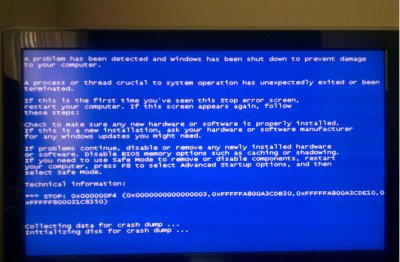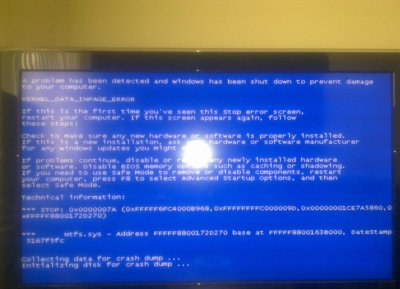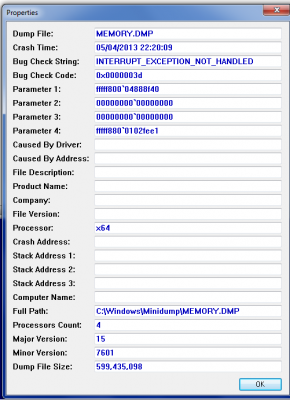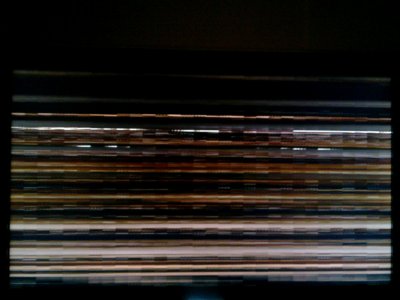When I built my current PC a few years back I'd get the occasional BSOD, just maybe once or twice a week if that. Over time they increased in regularity, until eventually it became almost impossible to use the thing at which point I took it apart and put it back together, checking all connections. I then re-installed Windows 7 and, for a month or two I was BSOD free.
Recently they've been creeping back, growing more and more frequent from week to week, since the re-install I have taken apart and cleaned my PC, doing a little cable management as I went, (this had no effect on BSODs but I thought I should point it out to show it's unlikely to be simply a loose connection) today however I've had two BSODs within the space of an hour and I want to try and stem the tide before I drown... again. That's why I'm seeking help from you guys
Memtest86 has found no errors with my RAM after 7 passes.
I have a hunch it might be something to do with my SSD; firstly the first things to stop working prior to a full BSOD are those stored on the SSD, for example it's where I installed the OS, the start menu will freeze up but skype and a game which are both stored in my 1TB will still be running fine for a good ten seconds. I don't know if that's normal for a BSOD but it seems a little weird to me. Secondly, when the computer automatically reboots following a BSOD for a split second after the BIOS the hard drive screen pops up showing only my 1TB hard drive and not the SSD. Thirdly it's the nature of the post BSOD boot manager screen, which states I need to use my windows disc to repair my computer because "Status: 0xc000000e" "Info: The boot selection failed because a required device is inaccessible".
I should also point out that despite the boot selection error after the automatic restart following the BSOD a second manual restart lets windows start normally.
The BSODs do not seem to be related to a specific activity, they can occur while many programs are running or while nothing at all is open.
The attached files are the two variants of BSOD I get, usually the extra info on the "uncommon" image is not present, incidentally apologies for the flash on that one.
SPECS:
Operating System
Microsoft Windows 7 Home Premium 64-bit SP1
CPU
Intel Core i5 2500K @ 3.30GHz 32 °C
Sandy Bridge 32nm Technology
RAM
8.00GB Single-Channel DDR3 @ 664MHz (9-9-9-24)
Motherboard
ASUSTeK Computer INC. P8Z68-V PRO (LGA1155) 33 °C
Graphics
HSG1142 (1920x1080@60Hz)
2048MB AMD Radeon HD 6900 Series (MSI)
Hard Drives
932GB SAMSUNG HD103SJ SCSI Disk Device (SATA) 34 °C
112GB TOSHIBA MKNSSDCR 120GB SCSI Disk Device (SSD)
Optical Drives
HL-DT-ST BD-RE BH10LS30
DTSOFT Virtual CdRom Device
Audio
Logitech G35 Headset
I'm sure you guys have far superior tech knowledge compared to myself, thanks for your time and I hope you can help me.
Recently they've been creeping back, growing more and more frequent from week to week, since the re-install I have taken apart and cleaned my PC, doing a little cable management as I went, (this had no effect on BSODs but I thought I should point it out to show it's unlikely to be simply a loose connection) today however I've had two BSODs within the space of an hour and I want to try and stem the tide before I drown... again. That's why I'm seeking help from you guys
Memtest86 has found no errors with my RAM after 7 passes.
I have a hunch it might be something to do with my SSD; firstly the first things to stop working prior to a full BSOD are those stored on the SSD, for example it's where I installed the OS, the start menu will freeze up but skype and a game which are both stored in my 1TB will still be running fine for a good ten seconds. I don't know if that's normal for a BSOD but it seems a little weird to me. Secondly, when the computer automatically reboots following a BSOD for a split second after the BIOS the hard drive screen pops up showing only my 1TB hard drive and not the SSD. Thirdly it's the nature of the post BSOD boot manager screen, which states I need to use my windows disc to repair my computer because "Status: 0xc000000e" "Info: The boot selection failed because a required device is inaccessible".
I should also point out that despite the boot selection error after the automatic restart following the BSOD a second manual restart lets windows start normally.
The BSODs do not seem to be related to a specific activity, they can occur while many programs are running or while nothing at all is open.
The attached files are the two variants of BSOD I get, usually the extra info on the "uncommon" image is not present, incidentally apologies for the flash on that one.
SPECS:
Operating System
Microsoft Windows 7 Home Premium 64-bit SP1
CPU
Intel Core i5 2500K @ 3.30GHz 32 °C
Sandy Bridge 32nm Technology
RAM
8.00GB Single-Channel DDR3 @ 664MHz (9-9-9-24)
Motherboard
ASUSTeK Computer INC. P8Z68-V PRO (LGA1155) 33 °C
Graphics
HSG1142 (1920x1080@60Hz)
2048MB AMD Radeon HD 6900 Series (MSI)
Hard Drives
932GB SAMSUNG HD103SJ SCSI Disk Device (SATA) 34 °C
112GB TOSHIBA MKNSSDCR 120GB SCSI Disk Device (SSD)
Optical Drives
HL-DT-ST BD-RE BH10LS30
DTSOFT Virtual CdRom Device
Audio
Logitech G35 Headset
I'm sure you guys have far superior tech knowledge compared to myself, thanks for your time and I hope you can help me.



